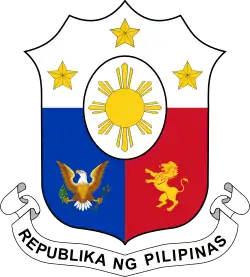Legislative district of Occidental Mindoro
The legislative district of Occidental Mindoro is the representation of the province of Occidental Mindoro in the various national legislatures of the Philippines. The province is currently represented in the lower house of the Congress of the Philippines through its lone congressional district.
 |
|---|
| This article is part of a series on the politics and government of the Philippines |
|
|
History
Prior to gaining separate representation, areas now under the jurisdiction of Occidental Mindoro were represented under the historical Mindoro Province (1907–1951).
The enactment of Republic Act No. 505 on June 13, 1950 split the old Mindoro Province into Occidental Mindoro and Oriental Mindoro, and provided each of them separate representation in Congress.[1] Pursuant to Section 6 of R.A. 505, the incumbent representative of Mindoro continued to serve the entire province until Occidental Mindoro's separate representative was elected in a special election held on the same day as the 1951 senatorial elections.[1]
Occidental Mindoro was represented in the Interim Batasang Pambansa as part of Region IV-A from 1978 to 1984, and returned one representative, elected at large, to the Regular Batasang Pambansa in 1984.
Under the new Constitution which was proclaimed on February 11, 1987, the province constituted a lone congressional district,[2] and elected its member to the restored House of Representatives starting that same year.
Beginning in 2019, the districts used in appropriation of members is coextensive with the legislative districts of Occidental Mindoro. Prior to 2019 when the province was just one congressional district, the Commission on Elections divided the province into two provincial board districts.
Lone District
- Population (2015): 487,414[3]
| Period | Representative[4] |
|---|---|
| 2nd Congress 1949–1953 |
see Lone district of Mindoro |
| Jesus V. Abeleda[lower-alpha 1] | |
| 3rd Congress 1953–1957 |
Felipe S. Abeleda |
| 4th Congress 1957–1961 | |
| 5th Congress 1961–1965 | |
| 6th Congress 1965–1969 |
Pedro C. Medalla |
| 7th Congress 1969–1972 | |
| 8th Congress 1987–1992 |
Mario Gene J. Mendiola |
| 9th Congress 1992–1995 |
Jose T. Villarosa |
| 10th Congress 1995–1998 | |
| 11th Congress 1998–2001 |
Ma. Amelita A. Calimbas-Villarosa[lower-alpha 2] |
| Ricardo V. Quintos[lower-alpha 3] | |
| 12th Congress 2001–2004 |
Josephine Y. Ramirez-Sato |
| 13th Congress 2004–2007 |
Ma. Amelita A. Calimbas-Villarosa |
| 14th Congress 2007–2010 | |
| 15th Congress 2010–2013 | |
| 16th Congress 2013–2016 |
Josephine Y. Ramirez-Sato |
| 17th Congress 2016–2019 | |
| 18th Congress 2019–2022 |
Notes
- Won the special election held on November 13, 1951 to fill the new province's congressional seat pursuant to R.A. 505;[1] took oath of office on January 28, 1952 and served for the remainder of the 2nd Congress.[4]
- Unseated after losing election protest to Ricardo Quintos on August 29, 2000.[4]
- Replaced Ma. Amelita Calimbas-Villarosa after winning election protest on August 29, 2000.[4]
At-Large (defunct)
| Period | Representative[4] |
|---|---|
| Regular Batasang Pambansa 1984–1986 |
Pedro T. Mendiola |
See also
References
- Congress of the Philippines (June 13, 1950). "Republic Act No. 505 - An Act to Create the Provinces of Oriental Mindoro and Occidental Mindoro". The Corpus Juris. Retrieved November 28, 2017.
- 1986 Constitutional Commission (February 2, 1987). "1987 Constitution of the Philippines - Apportionment Ordinance". Official Gazette of the Republic of the Philippines. Retrieved November 19, 2017.
- "Population of Population of Legislative Districts by Region, Province, and Selected Highly Urbanized/Component City: 2015". Philippine Statistics Authority. 2015. Retrieved November 28, 2017.
- Congressional Library Bureau. "Roster of Philippine Legislators". Republic of the Philippines, House of Representatives. Retrieved November 28, 2017.